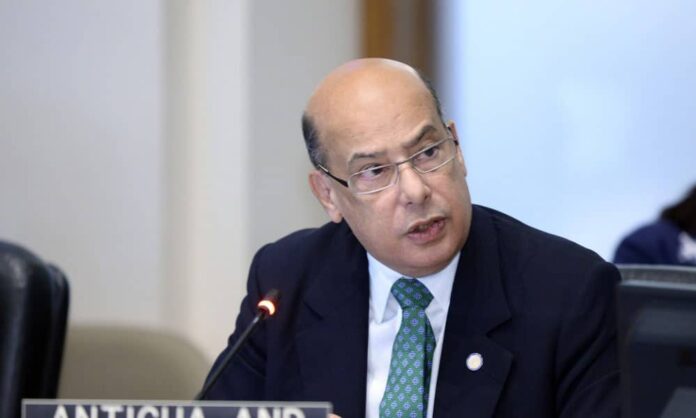The world has gone silent on the horrors in Gaza — that is the tragedy
By Sir Ronald Sanders
I was sitting in my dentist’s chair, one of the few events in which, while my mouth was open, I could not speak.
Even as she worked methodically, my dentist spoke close enough to my ear that her words were unmistakable. “The tragedy of Gaza,” she said, is that the world is in a state of “collapse of compassion.” Indeed, psychology and behavioural economics researchers have documented this. Simply put, suffering in others, witnessed frequently, produces a kind of immunity in the mind.
This can be the only explanation for why people around the world are not expressing outrage vociferously at the brutal and inhumane suffering and indiscriminate deaths of people, including children, from hunger and malnutrition in the prison that the Israeli government and its military forces have created in Gaza.
Since 17–18 March, Israeli air, land, and sea strikes—followed by expanded ground operations—have killed and wounded tens of thousands of civilians, flattened hospitals, schools and homes, and forced more than 1.9 million people (about 90 per cent of Gaza’s population) from their neighbourhoods, often several times over. Displacement orders now blanket roughly 282 km²—over four-fifths of the territory—leaving families to shelter in half-destroyed buildings or open fields with little protection.
Humanitarian aid has all but vanished. After nearly 80 days of a siege that barred food, medicine and fuel, only a small trickle of UN and NGO trucks has been allowed in by the Israeli government and its military forces—and the United Nations Relief and Works Agency for Palestine Refugees (UNRWA) has not delivered a single shipment since 2 March.
Of 323 planned aid convoys in June, 154 were denied, 30 impeded, and only 97 fully facilitated. As people converged on militarised distribution points in Rafah and Deir al-Balah, they faced deadly risks: by 25 June, at least 549 civilians had been killed and more than 4,000 injured simply trying to reach food. The desperation that led to this risk, even in the face of missiles and bullets, and the resulting wanton deaths, challenge humane understanding.
In clinics overwhelmed by trauma, malnutrition has reached record highs. Between January and May 2025, the United Nations Children’s Fund (UNICEF) recorded an average of 112 children admitted each day for severe malnutrition. Meanwhile, a four-month fuel ban threatens to shut down 40 per cent of Gaza’s drinking-water facilities that are still operating; without generators, these taps will run dry within weeks. Nearly half of essential medicines—heart drugs to antibiotics—are already out of stock, and another fifth will vanish within two months.
On the ground, every day is a struggle to survive. Women and girls bear an added burden. Observers from the UN Human Rights Office describe “scenes of chaos” at the few remaining food sites, where long queues leave the elderly, the disabled and children exposed to harassment and abuse. The United Nations Population Fund (UNFPA) reports that lack of food and cooking fuel has become a tool of coercion in some households. At the same time, the daily chore of fetching water or firewood exposes women to violence and exploitation.
At the international political level, inertia and inaction rule the day, as governments jockey over their national and their allies’ national interests. The UN Security Council sees more concern and more calls for action by its non-permanent members than from the five veto powers, each of which can block united action.
Finally, on 30 July 2025, foreign ministers gathered at UN Headquarters “with Gaza smouldering,” and Secretary-General António Guterres warned the situation was “at a breaking point” as they pledged to revive the two-State solution; that is, a recognised State of Palestine and a recognised State of Israel, both within secure borders.
However, beyond conditional recognition pledges—from Canada, the UK, France, and other EU states that tie Palestinian statehood to a ceasefire, hostage releases and elections—there has been no sustained global pressure to open corridors, rebuild infrastructure or protect civilians. Media coverage has dwindled, diplomatic visits have waned, and headlines have shifted elsewhere.
If the two-state vision is to be meaningful, it must be backed by deeds, not just declarations. The international community must insist on immediate, unhindered humanitarian corridors, establish a transparent reconstruction trust to fund homes, schools, and hospitals, deploy a stabilisation force to protect civilians and aid workers, and empower a reformed Palestinian Authority to restore basic services and security.
Neither Israel nor Hamas, which continues to hold hostages, can have matters their way, and the rest of the world should collectively tell them so, fearlessly and forcefully. CARICOM Governments, collectively and to their credit, have done so.
Silence in the face of suffering is a form of violence. The facts on the ground—documented by UNRWA, OCHA, UNICEF and OHCHR—are too stark to ignore. People are now scouring the dirt for food.
It is a tragedy that the people in Gaza are being killed and are also dying from starvation, malnutrition and lack of medicines. But the greater and real human tragedy is that the world is in a state of “collapse of compassion”, quietly looking away. It is time for the world to speak up, or Gaza will weigh heavily and permanently on the conscience of mankind.
(The author is the Ambassador of Antigua and Barbuda to the United States and the OAS, and Dean of the OAS Ambassadors accredited to the OAS. Responses and previous commentaries: www.sirronaldsanders.com)


